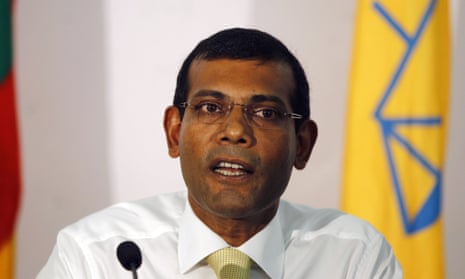A week ago, the former president of the Maldives warned that the island nation was on a “dangerous and precarious slide” towards authoritarianism and called on the international community to consider introducing sanctions against its leadership.
Now, days after voicing his concerns in an interview with the Guardian, Mohamed Nasheed – who says he has spent more than half of his adult life incarcerated – finds himself in detention once again under an anti-terror law, accused of using the military to arrest a senior judge during his time in office.
In the week before his arrest, Nasheed, the country’s first democratically elected leader, asked world leaders to take action against the government of president Yameen Abdul Gayyoom, and appealed to tourists travelling to the Maldives to reconsider their views on the popular holiday destination.
“It is good and necessary to have a relaxing holiday but important [they]understand what is happening here too,” he told the Guardian in an interview in Malé, the capital of the Maldives, last week.
More than a million tourists visited the tropical island destination last year, many from the west. Few see much of the country beyond their resorts.
Nasheed resigned as president in 2012 following weeks of protests over the judge’s arrest, in what supporters claim was a coup.
He failed to win back power in elections in 2013 after a first round of voting which he had won was cancelled following allegations of vote-rigging.
Amnesty International has also been critical of the human rights situation on the islands, raising the case of Ahmed Rilwan Abdulla, a well-known journalist who disappeared last year, and alleging systematic impunity for human rights violations, especially for torture and other ill-treatment, and for excessive use of force by police against demonstrators.
Relatives of the disappeared man accuse police of being “either negligent or complicit in the abduction.”
A report released by Amnesty last month said the government had been “effectively undermining human rights protection by failing to strengthen the independent institutions of the state.”
“I have spent more than half my adult life in prison or banishment but we cannot give up or relent, I hope Maldivians understand that if we lose these institutions we lose everything,” said Nasheed, speaking before his arrest.
“The international community have a number of tools they can engage on this,” he said.
“The majority of our trade is with Europe and any ups or downs will have a big effect on our society here.
“Whatever means possible to maintain the democratic trajectory here must be considered, including, after all other avenues have been exhausted, sanctions.”
Nasheed has also highlighted what he says is growing Islamic extremism in the Muslim nation.
Transparency Maldives, an NGO, recently expressed concerns about “the increasing trend of undermining democratic practices and institutions”, particularly the independence of the judiciary in the archipelago of 1,200 islands.
But it also criticised Nasheed’s Maldivian Democratic Party for an “attempt to destabilise the elected government”.
Ibrahim Muaz Ali, a spokesman for the government of President Yameen Abdullah, said the accusation of authoritarianism was “absolutely unfair”.
“We have carefully separated powers between the president, parliament and judiciary. The Maldives practises parliamentary democracy,” he said.
Ali said the government’s focus was on economic development.
“The ballot box is paramount in a democracy and we have a majority in parliament. All actions taken are in accordance with the constitution,” he said.
The island nation has suffered repeated bouts of political instability since the end of the 30-year rule of authoritarian ruler Mamoun Abdul Gayoom in 2008.
Factions loyal to the ousted autocrat have retained significant influence in key institutions, including the judiciary and the police. The current president is Gayoom’s half-brother.
On 15 February, authorities withdrew charges against Nasheed over his order to arrest criminal court chief judge Abdulla Mohamed, which could have seen the 47-year-old politician jailed and barred from competing in the next scheduled presidential polls in 2018. But Nasheed was rearrested on Sunday over the case.
Mohamed Shareef, a government minister, toldAP that Nasheed was arrested because a criminal court believed he may not honour a summons to stand trial in the case, adding that the anti-terrorism laws he had been detained under relate to wide range of “acts against the state.”
Nasheed is accused of detaining Mohamed for weeks without trial, according to Shareef.
At the time, Nasheed’s government had accused Mohamed of bias and corruption after he released an opposition politician.
About 1.2 million tourists visited the Maldives in 2014, a 7.1% increase on the year before.
Tourism is the biggest industry for the country of 350,000 and has been boosted in recent years by growing numbers of Chinese holidaymakers. Most resorts are situated on uninhabited islands exempt from strict laws prohibiting alcohol in the Muslim state.
The Maldives’ $3bn (£2bn) economy grew by 4.5% last year, according to the Asian Development Bank and is forecast to do slightly better in 2015.
Government publications claimed substantially higher growth rates. However the country suffers from a range of social problems including high rates of youth unemployment, drug abuse and overcrowding.
